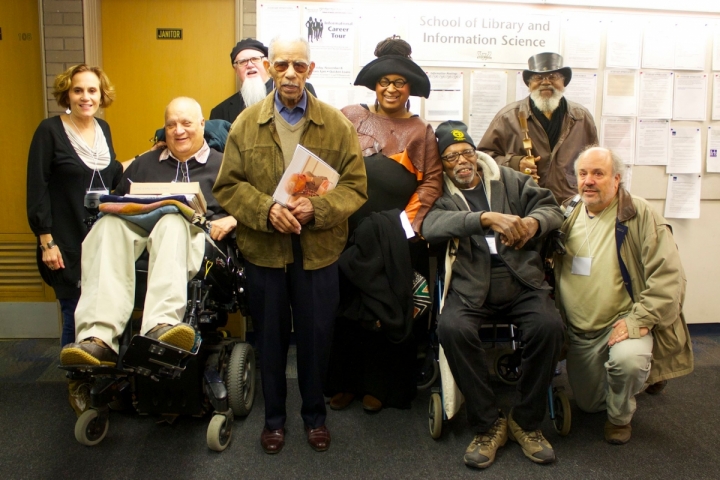In the Presence of Labor History Giants

At the North American Labor History Conference in Detroit
I got a chance to share a work sample of Detroit 48202: Conversations Along a Postal Route for the first time to a Detroit audience at the North American Labor History Conference held at Wayne State from Oct. 24-26, 2013. I was lucky to share a panel with WSU Prof. Todd Duncan entitled, Cinematic Images of Labor in Detroit. The essence of the presentations, and the vibrant discussion that followed, was that there are important grassroots Detroit voices, that often don't get heard, but that express histories and struggles that complicate a sometimes simplistic, exploitative narrative about the city's past and present. It made me really think about what images we media makers choose to highlight: empty buildings or people?
Duncan shared clips from Detroit's Un-ruined Voices, an oral history/documentary project he had begun with the late Kathryne Lindberg. Among the voices heard were Dave Moore and Quill Pettway, radical black autoworkers whose organizing dates back to the early years of the UAW. Moore (now passed on) and Pettway (now in his 90s and still teaching) were instrumental in the formation of the National Negro Labor Council, which was set up to demand a place at the leadership table of the labor movement for black workers. In one clip, General Baker, a founder of the League of Revolutionary Black Workers, spoke about the crucial mentorship his generation of "revolutionaries who happened to work in auto factories" received from Moore and Pettway. From the audience, Marsha Battle-Philpot spoke of the mentorship she received from General Baker when she was the youngest member of the "League," and encouraged those with filmmaking skills to help Todd Duncan continue the Un-ruined Voices project so that present and future labor activists can learn from them.
Detroit's Un-ruined Voices laid a good foundation for the audience to consider a clip of Detroit 48202: Conversations Along a Postal Route and the response was inspiring. Two scenes, in particular, seemed to resonate with the viewers: Wendell, our mailman walking along and reflecting on the existence of the infamous "separation wall" near Wyoming and 8 Mile; and me, Wendell, and others sitting and talking on the steps of the house I grew up in in Highland Park.
Seeing the wall, erected between a black community and land that a developer wanted to build homes on for whites in the 1940s, on screen was an "Aha! moment." People wanted to know, How? Why? Why didn't we know about this growing up? One person in the audience explained that the silence in the community about the wall was part of black parents' way of shielding their children from the ugly past of racial segregation. For me, the discussion around the wall pointed to the potential of the film to generate deeper questions about the role systematic racism in policy decisions have played in the development and economic decline of Detroit.
To close my presentation I chose to share a clip of my “nostalgic return” to the house I grew up in in Highland Park. One might jump to the conclusion that I would return to a shell of house on a devastated block. But because real Detroit stories are complicated and nuanced, the opposite was the case. Except for a burned apartment building on the corner and one boarded up house, McLean Avenue between Woodward and John R is an intact block of well maintained homes. Indeed, the 16,000 overwhelmingly black Highland Park residents face an extremely difficult situation, with an imposed Emergency Manager, a closed (but once magnificent) public library, and 1,400 missing street lights (physically removed by DTE Energy because HP owed the utility money). But, my block of McLean Ave. is a symbol of resistance and resilience. The scene I shared reveals a group of us sitting on the steps of “my” house with the owner, who is white, grew up on the next street, and bought the house 18 years ago. The conversation touched on Highland Parkers who have fought to save black history books being thrown out at the high school, a committee being formed to fight to reopen the library, and the strength of the block.
Marsha Battle-Philpot said the scene was compelling because it was like my “shock and awe.” I love the scene because it turns a few stereotypes upside down! Is it any wonder that General Baker lives next door?